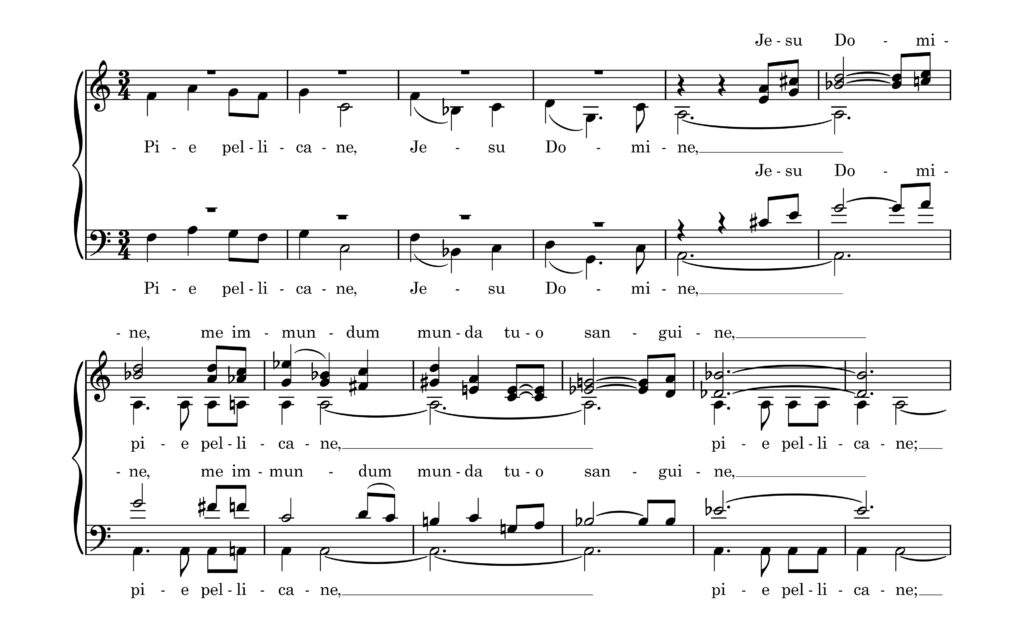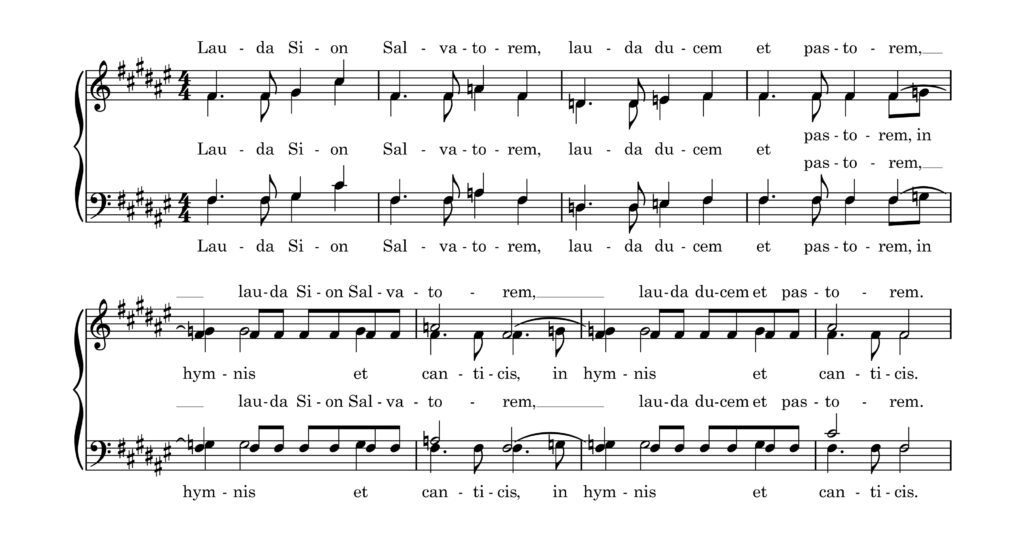I made it! Between Thursday June 22nd and Friday June 30th I composed over 12 minutes of brand-new music, in the form of submissions to the two composition competitions I stumbled over, two weeks ago.
As I described in last week’s post, I initially focused on the brass band composition as it was the one I was most worried about of the two. I did put together the lyrics and decide on a structure for the choral piece, but only really had sketches for the music after the first five days or so.
In fact, all of the real compositional work on the choral piece happened in only three days’ time: from Tuesday the 27th to when I submitted the score on the evening of the 29th, just two days later.
The choral composition competition required you to relate to English 20th century composer Gerald Finzi’s Lo, the full, final sacrifice for mixed choir and organ. I decided early on that I wanted to use the same texts as Finzi had (which was an option, but not a requirement). Gerald Finzi had picked stanzas from two poems by Richard Crashaw, which were poetic English translations of Latin hymn texts by Saint Thomas Aquinas.
I compiled my own lyrics, picking stanzas from Aquinas’ two original texts instead of from Crashaw’s translations. Some overlaps exist between my selections and Finzi’s; however, I have ordered my stanzas differently, which also changes the tone of the resulting lyrics slightly.
My text lent itself naturally to a three-part structure: A slow, introspective first section, followed by a jovial and celebratory middle section, and finally a tranquil final section.
Another early decision was to include a couple of musical quotes from Finzi’s work, although more like discreet nods to Finzi, or easter eggs, rather than easily identifiable, full-fledged quotes. I ended up selecting three short phrases from various points in Lo, the full, final sacrifice that I used more like tone rows, rather than copying them verbatim.
The first Finzi quote comes immediately in the first section of my composition, where I have set lyrics by Thomas Aquinas corresponding to parts of Richard Crashaw’s text set by Finzi. Thus, I took the first few bars from that passage in Finzi’s piece (at rehearsal mark 9 in the score, if you have the sheet music at hand):

Compare the first three bars in the excerpt shown above with the altos’ and basses’ entry in bars 1–5 in my work, shown below. Also: the top line when the sopranos and tenors enter, beginning in bar 5, is based on the subsequent three bars as shown above. Here is the beginning of my work:

Again, note that the lyrics match up, at least thematically. Comparing Jesus Christ to a pelican refers back to an early Greek Christian text describing a legend where the pelican mother kills her infants, but in her regret, she strikes her own side, drawing blood, and brings her children back to life with her blood.
The middle section of my work borrows from what I would describe as the central, recurring melodic motif in Lo, the full, final sacrifice. However, Finzi uses it in an entirely different mood than I do, not to mention in an altogether different rhythm, so this one is probably the hardest quotation to catch on your own. The motif in question occurs right at the start of Finzi’s piece and then reappears several times, such as seen here, starting at bar 41 in the choir:

Compare (and contrast!) the above to the start of my middle section below, in a different key and an entirely different tempo. Finzi’s music is to be performed very delicately and almost restrained, while mine is to be sung at a brisk and joyful tempo:

If you look closely, you might will notice that I have not followed the intervals between the different notes exactly. I have altered the intervals slightly in a few places, in part to fit within my key of choice, but mainly to account for the fact that my melody begins on F-sharp, the first note of the key of F-sharp major, whereas Finzi’s begins on E, the fifth of A minor.
Further on in the middle section, I use Finzi’s sequence less explicitly, referring back to it more like a kind of guide to the part-writing or perhaps tracing the contour of Finzi’s melody rather than following it in step.
In the final section, I return to the slow and introspective mood of the beginning of the piece. The music here does not draw actively from Finzi’s work. I still had it in the back of my mind, informing the way I wrote, but more overt influences are Bach, and perhaps even more so Brahms.
At the very end of my piece comes the most overt quotation from Finzi, using the first bar of his elegant, polyphonic “Amen” as the basis for my own counterpart:

I had initially envisioned writing a slightly longer, more elaborate “Amen” as well, but out of necessity I had to scrap those plans. On the one hand, I already had well over six minutes of music (with a stipulated max duration of eight mins!), plus I didn’t really have enough time to work out the perfectly ornamented “Amen”. So I made do with a simple and sweet one, like this:

Stylistically, one could argue that my work, Pie pellicane, Jesu Domine, is a bit all over the place. However, I would counter-argue that that in itself is part of my stylistic identity. I would further argue that I manage to hold the threads together through a melodic and rhythmic consistency, if nothing else.
By writing so clearly in my own voice, instead of trying for an explicit companion piece to Finzi’s, I believe my work stands on its own and not simply as a competition piece that won’t find an audience outside of this context.
As an avid chorister and keen choral composer, as well as occasional choral conductor, writing this piece was exciting and rewarding, and I am quite proud of it. I believe it will be rewarding and enjoyable to perform as well, to whichever ensemble ends up premiering the piece – as well as every subsequent ensemble that studies it, of course!
I could not wish for a better way to tie up the first half of the year than by finishing two great new pieces. Now I have a summer of renovations ahead of me, as well as a couple of smaller music ideas I would like to explore. And a bunch of games and books I look forward to spending time with.
See you again in September, dear reader. I hope you too will have a wonderful summer.
